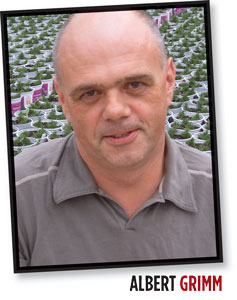6/1/2018
Happy? At Work?
Albert Grimm

As a head grower, I often feel like a character from the movie Pulp Fiction: “Hello. I’m Mr. Wolf. I solve problems.”
I chose this role, not because I’ve always dreamt of being a professional problem solver, and not because it pays more to solve problems than to create them. I do this because I enjoy the challenge and because it energizes me when I can sink my teeth into analyzing and understanding the often-complex reasons that cause plant production to go off the rails.
Sometimes I miss “real” growing, as in touching plants and swinging the water hose, and I might jump at an opportunity to turn off my computer, put on the spray gear and go out to kill some aphids. I’m as genuinely happy when I can harvest cuttings with my hands, as I am when I’m trying to figure out why my plants are dropping their leaves.
This wasn’t always so. Many years ago, I found myself a job at an institutional greenhouse. I was attracted by the hourly pay rate, which was far more than anything that would have been offered to me by industry. I learned quickly that the money came at an unexpected price.
On my first day, the supervisor accidentally locked me into the building because I was still at work even though it was only 10 minutes to quitting time. I hadn’t obeyed the master rule, which placed any initiative under intense scrutiny. Conformance took priority over performance and enthusiasm was displaced by obedient submission into lackluster routines. Those two years were the most miserable work experience in my life and it felt like I was doing time. Good pay was merely the ball on the chain.
Eventually, I escaped into a job that paid minimum wage. For 60 hours a week, I was planting trees with a pick-axe, shovel and a team of like-minded guys. We worked very hard and we had a blast. It was the most liberating work experience I ever had. For the first time, I had experienced freedom created by my work. I was accomplishing something because I wanted to—not because I had to.
We’re being taught that money equals happiness, and when we’re young and lack experience, it’s easy to buy into the pursuit of money as the only justifiable reward for the time and the energy that we spend at work. If, against the odds, we do succeed in finding an easy path to money, it’s surprising how quickly the thrill of each successive paycheck wears off faster than the previous one. A career that’s based solely on the pursuit of money tends to produce hollow victories and doesn’t bring the satisfying sense of accomplishment that we associate with happiness.
Happiness should be the most impactful reward for our work and the experience of living our passion should be the motivation. Most of us spend far more time at work than at play and it has a huge impact on the quality of life if our workdays turn into endless hours of mildly miserable boredom. If we seek happiness, we might be more successful if we develop work itself into a source of happiness, rather than simply trying to harvest as much cash as quickly as possible.
I’m certainly not advocating that you shouldn’t seek to get paid well; I’m simply suggesting that you might not want to give money the top spot in your list of priorities. There’s no need for that. If you’re passionate about your work, and if you enjoy mastering challenges, then it’s very likely that you’ll become very good at what you’re doing. And there’s plenty of evidence that lasting financial success does follow genuine competence.
The field of horticulture is one of the last bastions where freedom to create happiness is still obtainable in the workplace. Our knowledge of plant production is still so limited that several generations of growers won’t have to face the calamity of completely predictable results.
For the foreseeable future, individualistic problem solvers can find a place to think outside the box and seek opportunities in non-conformity. This counts, because in the blood of every successful greenhouse grower flows some of the spirit of a freewheeling buccaneer. GT
Albert Grimm is head grower for Jeffery’s Greenhouses in St. Catharines, Ontario, Canada.